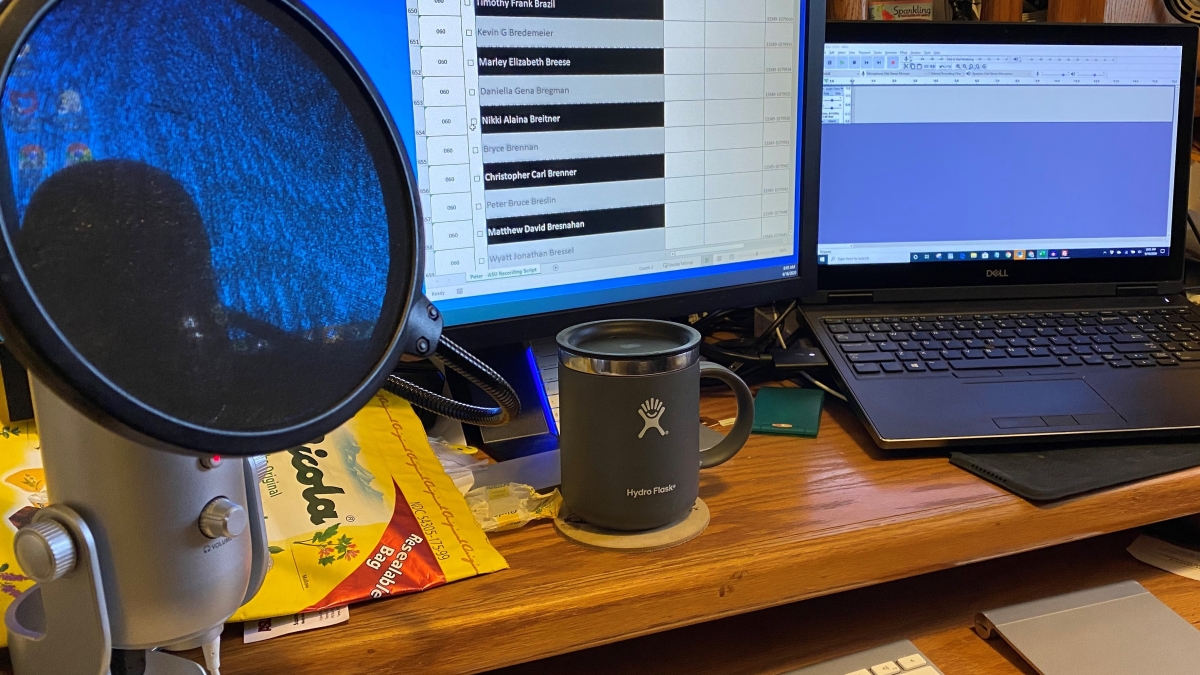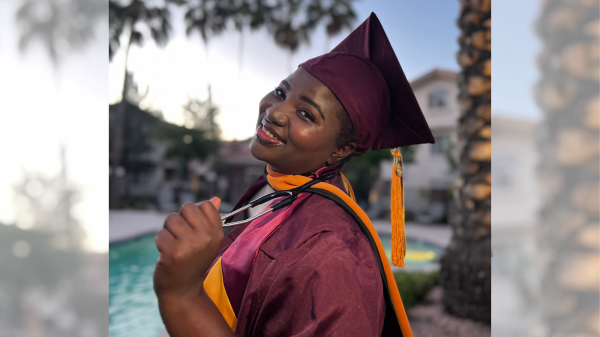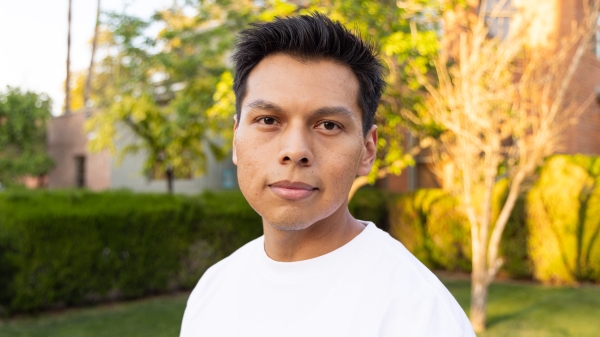Graduation name reader expands range for ASU’s first virtual ceremonies
Peter Lafford has prepared more than 100,000 names for graduation since 1995

You could say Peter Lafford is a bit of a name-dropper. And it’s a habit that’s made a good impression on graduates of Arizona State University year after year.
Over the last 25 years, Lafford, a multilingual technology professional, has been spending the final weeks of the fall and spring semesters at ASU reading and recording the names of graduating students preparing to cross the stage at their college convocations. This year is no different for Lafford, but at the same time, it is — a virtual distinction is putting his dulcet tones to the test.
In a typical year, Lafford’s voice can be heard announcing roughly 3,000 names across various graduation ceremonies at ASU. But with 2020 unfolding as anything but a typical year, Lafford is expanding his announcing range sixfold — to the tune of 18,000 names. Lafford took on the challenge when ASU made a quick pivot to honor the Class of 2020 with the university's very first online ceremonies, transformed into such due to safety concerns related to the coronavirus pandemic.
Under usual conditions, as in years past, names earmarked for graduation are called through a mix of live and prerecorded announcements. This year, all names have been prerecorded for the virtual ceremonies, and Peter Lafford can stake claim to more than 80% of those recordings.
Lafford recorded 15,000 of the 18,000 names that will be announced on May 11 and 12. It took 90 hours, gallons of water and packets of throat lozenges for Lafford to complete this breathtaking assignment as the graduating names became available for recording with the opening of the virtual ceremony website on April 6.
Peter Lafford talks about what it's like to record names for ASU convocation. Here, he's pictured announcing graduate names at the 2014 ASU Convocation. Photo by Charlie Leight. Audio by Suzanne Wilson.
Having a mastery of four languages — English, Spanish, French and German — helps Lafford deliver the goods, but he is quick to point out that there can never be too much preparation for the size and scale of this monumental occasion.
A company called MarchingOrder has been a preferred pronunciation partner for Lafford for 11 of the 25 years he has been calling names at graduation ceremonies. But for as many names as he has prepared for announcement over the decades — approximately 100,000 as of May 2020 — Lafford says there will always be tongue-twisting name challenges that will require more prep than others. He has seen his fair share of those — Gwendolyn Kamakaukapunanaulaukalani Emmsley (GWEN-doh-lin KA-ma-KA-u-ka-PU-na-na-u-LA-u-ka-LA-ni EMMZ-lee), a student from Hawaii, among them. Lafford says that he memorized the name to be ready for the English major’s convocation stage crossing at the College of Liberal Arts and Sciences ceremony in 2010 — and that was before MarchingOrder introduced the option for students to record their names for pronunciation.
Spreadsheets, emails and voice messages were the order of the day before MarchingOrder, according to Lafford. He says he and the other readers would meet to go over spreadsheets of names, email students for clarification and ask those with more challenging name pronunciations to leave a voice message for phonetic accuracy.
Live ceremonies got much easier for name readers when ASU commencement planners brought MarchingOrder on board in 2009. That was also the year Lafford read graduate names to his biggest commencement audience to date. Some 60,000 attendees packed ASU’s Sun Devil Stadium to celebrate the graduates and listen to President Barack Obama deliver the commencement address. It was an experience Lafford describes as "an honor."

Photo by Deanna Dent.
What is still an honor for Lafford after a quarter of a century of name-calling is putting a smile on graduates’ faces after announcing their names as conferred. He imagines that the announcements he will make for this year’s virtual ceremonies will be even more meaningful for graduates as they will be able to visit the dedicated web page, find their slides, download the announcement clips and share them on social media.
So while the commencement with President Obama may have been his largest live audience, this year’s virtual ceremony has the potential to reach an even wider global audience online.
There is also personal satisfaction for Lafford in reading names, challenging and not-so challenging, at commencement ceremonies year after year. The now emeritus associate research professional for ASU’s University Technology Office says he doesn’t mind coming out of retirement for these seasonal announcement jobs.
Lafford, who launched his name calling vocation by stepping in last-minute to fill in for his wife, Spanish and linguistics professor Barbara Lafford in 1995, says reading so many diverse names every year at commencement offers a window into different cultures — and it gives his linguistic experience “a good workout.”
Top photo: Lafford's recording space for the 15,000 names that will be read at this year's online convocation. Photo courtesy Peter Lafford
More Sun Devil community

A big move leads to even bigger opportunity for ASU grad
Moving, no matter the distance, can be a big undertaking — but moving to another country? That's life changing. Bilha Obaigwa made that life-changing leap in 2019 when she immigrated to the United…

Students amped for Devilpalooza 2024 just around the corner
The thrill of live music coursing through your body. Crowds of Sun Devils dancing the night away in a jam-packed arena. Electric performances back to back — from local bands to a famous celebrity…

Dean's Medalist embraces heritage language through poetry
Editor’s note: This story is part of a series of profiles of notable spring 2024 graduates. When he first enrolled at Arizona State University, Chris Hoshnic thought he’d found a shortcut to the…